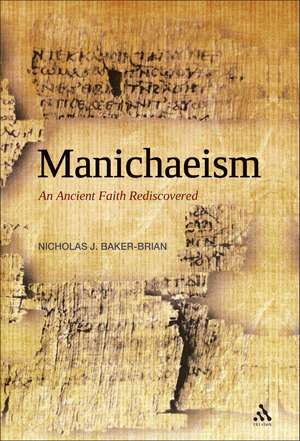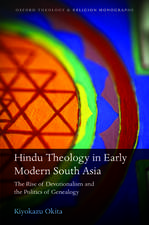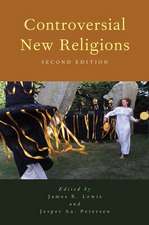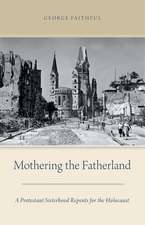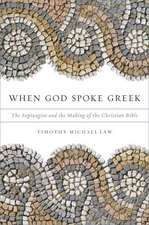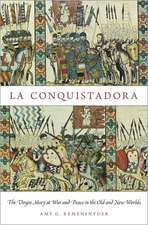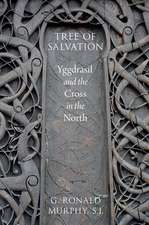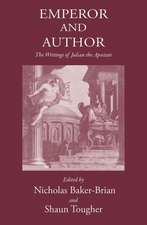Manichaeism: An Ancient Faith Rediscovered
Autor Dr Nicholas J. Baker-Brianen Limba Engleză Hardback – 16 feb 2011
| Toate formatele și edițiile | Preț | Express |
|---|---|---|
| Paperback (1) | 236.37 lei 6-8 săpt. | |
| Bloomsbury Publishing – 16 feb 2011 | 236.37 lei 6-8 săpt. | |
| Hardback (1) | 888.50 lei 6-8 săpt. | |
| Bloomsbury Publishing – 16 feb 2011 | 888.50 lei 6-8 săpt. |
Preț: 888.50 lei
Preț vechi: 1139.90 lei
-22% Nou
Puncte Express: 1333
Preț estimativ în valută:
170.02€ • 181.80$ • 141.75£
170.02€ • 181.80$ • 141.75£
Carte tipărită la comandă
Livrare economică 17 aprilie-01 mai
Preluare comenzi: 021 569.72.76
Specificații
ISBN-13: 9780567031662
ISBN-10: 0567031667
Pagini: 176
Ilustrații: 10
Dimensiuni: 156 x 234 x 18 mm
Greutate: 0.4 kg
Ediția:New.
Editura: Bloomsbury Publishing
Colecția T&T Clark
Locul publicării:London, United Kingdom
ISBN-10: 0567031667
Pagini: 176
Ilustrații: 10
Dimensiuni: 156 x 234 x 18 mm
Greutate: 0.4 kg
Ediția:New.
Editura: Bloomsbury Publishing
Colecția T&T Clark
Locul publicării:London, United Kingdom
Caracteristici
aimed at non-specialists and undergraduates in a wide range of academic courses
Notă biografică
Dr Nicholas Baker-Brian is Lecturer in Theology at Cardiff University. He is an expert on the Religions of Late Antiquity, especially Manichaeism, and is the author of Manichaeism in the Later Roman Empire: A Study of Augustine's Contra Adimantum.
Cuprins
Introduction / Chapter 1: The Rediscovery of Manichaeism: Controversies and Sources / Chapter 2: Lives of Mani / Chapter 3: Manichaean Theology I: Theology and Text / Chapter 4: Manichaean Theology II: The Universe, Its Rituals, and its Community
Recenzii
Not too long ago, most of what we knew about the Manichaeans - followers of the third-century religious visionary Mani - came from the pens of their many enemies. It was hard to understand how a religion that preached sexual abstinence and vegetarianism as a means to cope with a world ruled by Evil ever enjoyed any success. Yet at its height Manichaeism spread from Mesopotamia to China in the east and Spain in the west; in North Africa, it appealed to the young Augustine of Hippo. In this richly informative new study, Nicholas Baker-Brian digests new discoveries and the explosion of new thinking they have provoked into a solid introduction to a belief system that influenced religious thinking in Europe and Asia for a millennium. He is especially attentive to the connection between lost rituals and myths that for the first time allows readers to see Manichaeism as a comprehensive set of ideas and practices. His exemplary handling of sources and discussion of how to use them make this book as much a primer for students of antiquity as for students of religion.
In the studies of ancient religions and cultures few disciplines are more difficult to approach than Manichaeism, quite simply for its code of conduct, teachings and internal organization has long puzzled scholars. Its study involves the analysis of a number of key areas -theology, mythology, comparative literature and ancient history to name but a few- and deals with texts written in countless languages -namely Latin, ancient Greek, Syrian and Arabic- spanning a period of thirteen centuries, throughout a vast territory. Nevertheless misconceptions, a biased historiographical heritage and a certain degree of sluggishness on the part of many modern scholars in dealing with original sources have all contributed towards constructing a somewhat distorted image of Manichaeism. Hence it is within this context that Nicholas Baker-Brian´s book sets out to dispel such inaccuracies and work towards establishing a more coherent understanding of such a complicated topic, irrespective of the fragmentary and corrupt nature of many of the sources on Mani´s life and teachings. In doing so, Dr. Baker-Brian contests that certain beliefs in such misleading information and evidence derived from ancient heresiologists have long been perpetuated by modern scholars. Insightful analysis of original sources that had been carelessly read and therefore led to methodological misreading are constant throughout this work and help decipher the intricate layers that came to constitute Manichaeism. In free from stereotyping analysis Dr Baker-Brian sets out to deconstruct the monolithic conception that many scholars have come to embrace with regards the figure and doctrines of Mani, citing that they themselves have projected their own concerns onto a very different historical setting and thus adopted many of the ill-found, often biased testimonies that late antique heresiologists had already ascribed to Mani´s doctrines. In analyzing each text and testimony within its own historical context, Dr Baker-Brian goes on to reveal the various literary and historical strategies that helped make up the identity of Manichaeism, elaborating upon religious, mythological and historical elements, rearranged in a final portrait that both clarifies and enriches our knowledge of the religion. Credit is due for the construction of this monograph: for ultimately, thanks largely to the author's endeavors, such exposure seeks to help prevent both scholars and students from relying on simplistic and oversimplified concepts, in turn fortifying the belief in Manichaeism as an autonomous discipline, and most importantly perhaps, opening new lines of investigation for future research free from untainted historical inaccuracies. Once again, this is indeed a very much welcomed contribution that successfully manages to expurgate mistaken beliefs from original sources and modern bibliographies whilst at the same time offers a concise, detailed and substantiated image of Mani and his doctrine.
... manages to incorporate many critical perspectives and discussions... a straightforward and accessible treatment of a topic that is too often neglected.
In short, Manichaeism: An Ancient Faith Rediscovered is quite a straightforward and accessible treatment of a topic that is too often neglected or considered as tangential to other "world" world religions. Baker-Brian's analysis is at home in the academic study of religion, which does not take as self-evident either its object of study or the categories available to describe it.
In the studies of ancient religions and cultures few disciplines are more difficult to approach than Manichaeism, quite simply for its code of conduct, teachings and internal organization has long puzzled scholars. Its study involves the analysis of a number of key areas -theology, mythology, comparative literature and ancient history to name but a few- and deals with texts written in countless languages -namely Latin, ancient Greek, Syrian and Arabic- spanning a period of thirteen centuries, throughout a vast territory. Nevertheless misconceptions, a biased historiographical heritage and a certain degree of sluggishness on the part of many modern scholars in dealing with original sources have all contributed towards constructing a somewhat distorted image of Manichaeism. Hence it is within this context that Nicholas Baker-Brian´s book sets out to dispel such inaccuracies and work towards establishing a more coherent understanding of such a complicated topic, irrespective of the fragmentary and corrupt nature of many of the sources on Mani´s life and teachings. In doing so, Dr. Baker-Brian contests that certain beliefs in such misleading information and evidence derived from ancient heresiologists have long been perpetuated by modern scholars. Insightful analysis of original sources that had been carelessly read and therefore led to methodological misreading are constant throughout this work and help decipher the intricate layers that came to constitute Manichaeism. In free from stereotyping analysis Dr Baker-Brian sets out to deconstruct the monolithic conception that many scholars have come to embrace with regards the figure and doctrines of Mani, citing that they themselves have projected their own concerns onto a very different historical setting and thus adopted many of the ill-found, often biased testimonies that late antique heresiologists had already ascribed to Mani´s doctrines. In analyzing each text and testimony within its own historical context, Dr Baker-Brian goes on to reveal the various literary and historical strategies that helped make up the identity of Manichaeism, elaborating upon religious, mythological and historical elements, rearranged in a final portrait that both clarifies and enriches our knowledge of the religion. Credit is due for the construction of this monograph: for ultimately, thanks largely to the author's endeavors, such exposure seeks to help prevent both scholars and students from relying on simplistic and oversimplified concepts, in turn fortifying the belief in Manichaeism as an autonomous discipline, and most importantly perhaps, opening new lines of investigation for future research free from untainted historical inaccuracies. Once again, this is indeed a very much welcomed contribution that successfully manages to expurgate mistaken beliefs from original sources and modern bibliographies whilst at the same time offers a concise, detailed and substantiated image of Mani and his doctrine.
... manages to incorporate many critical perspectives and discussions... a straightforward and accessible treatment of a topic that is too often neglected.
In short, Manichaeism: An Ancient Faith Rediscovered is quite a straightforward and accessible treatment of a topic that is too often neglected or considered as tangential to other "world" world religions. Baker-Brian's analysis is at home in the academic study of religion, which does not take as self-evident either its object of study or the categories available to describe it.
